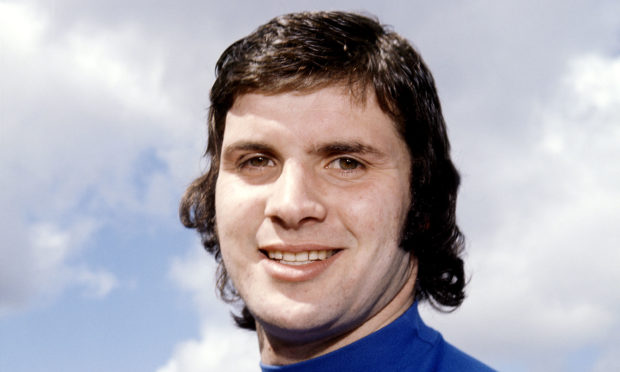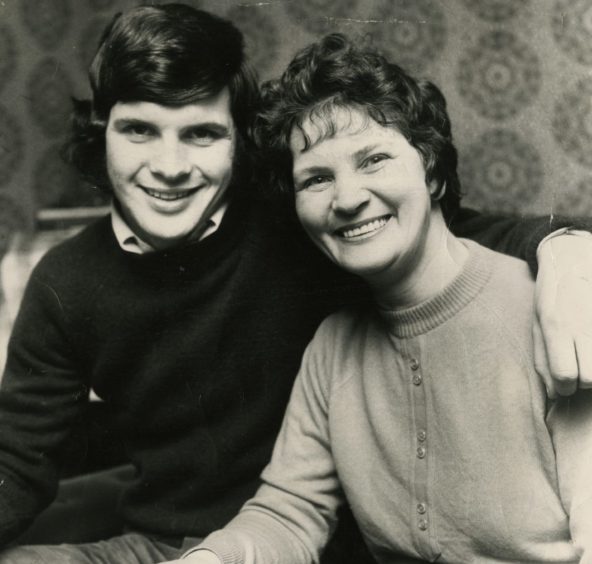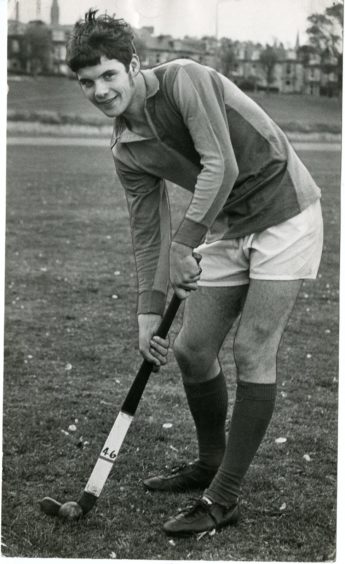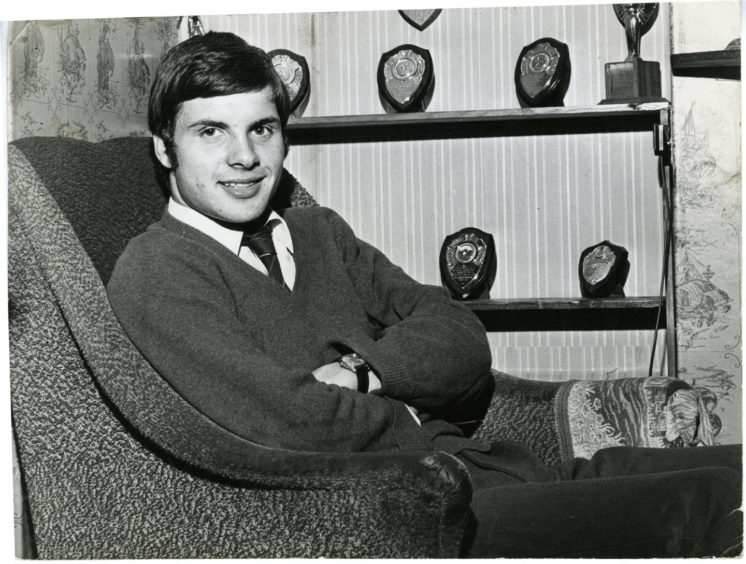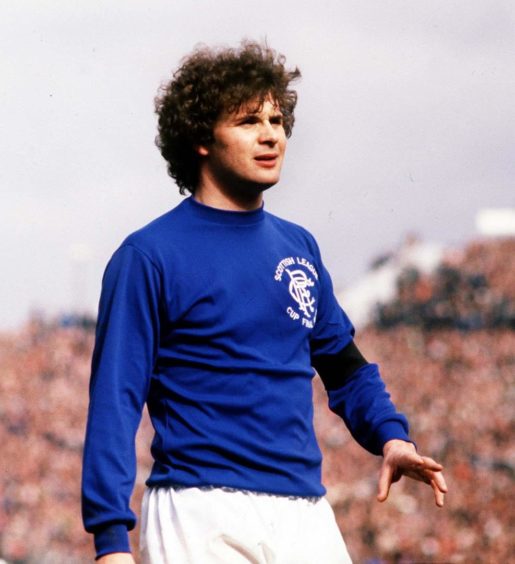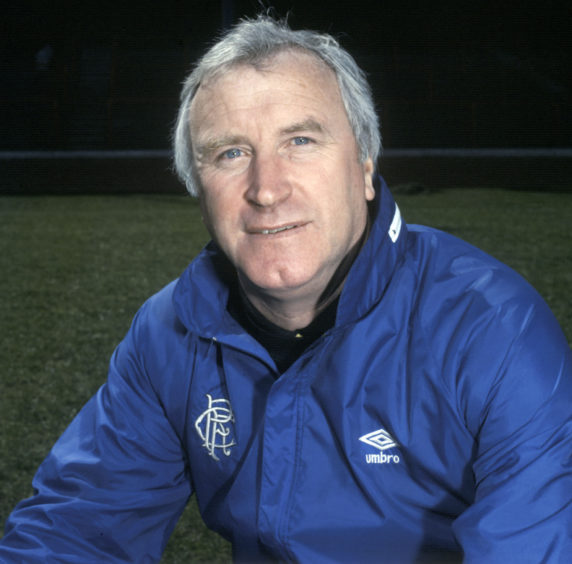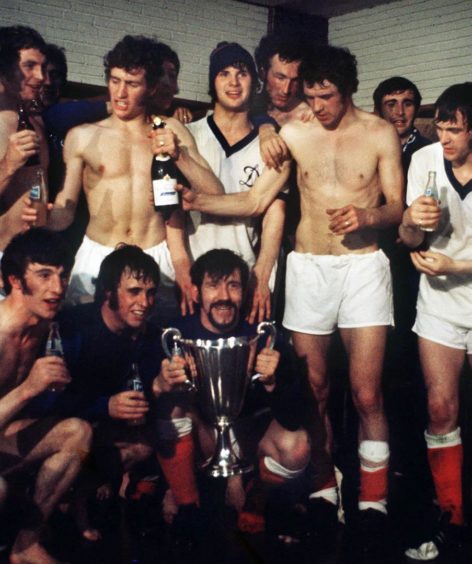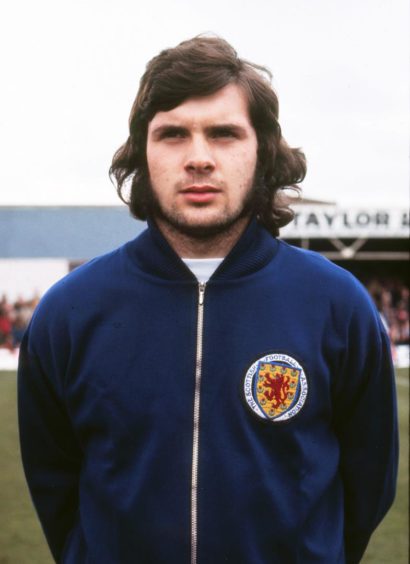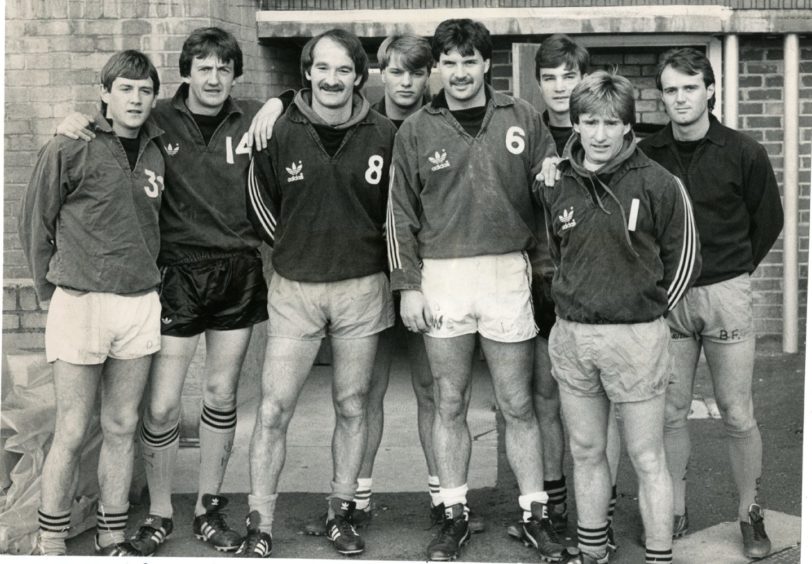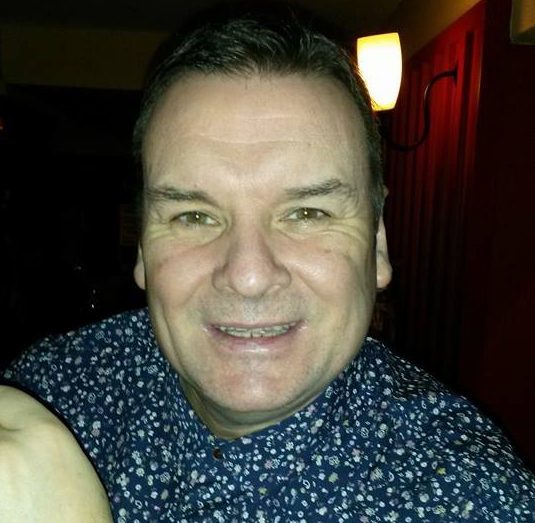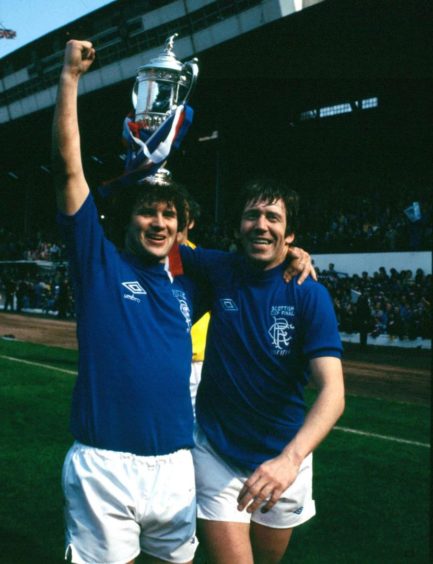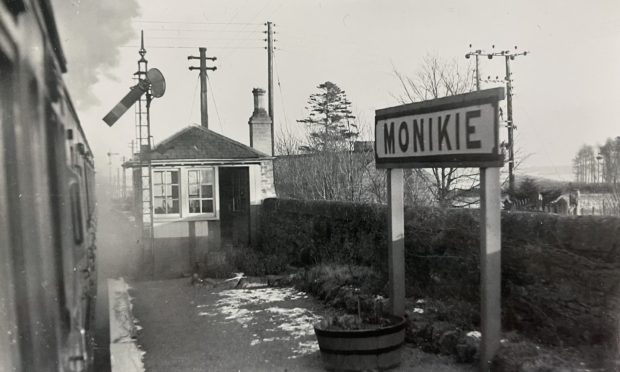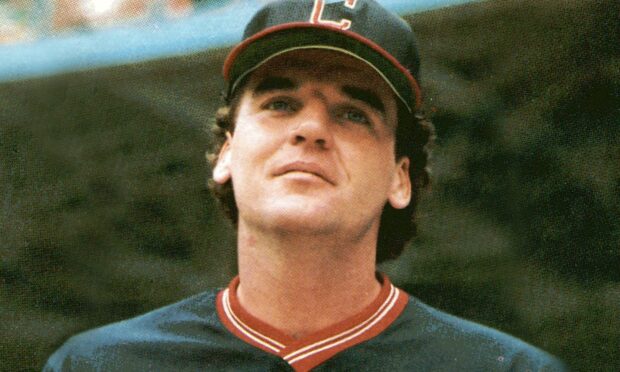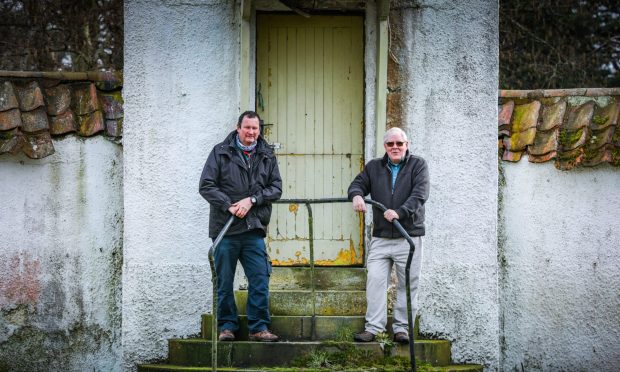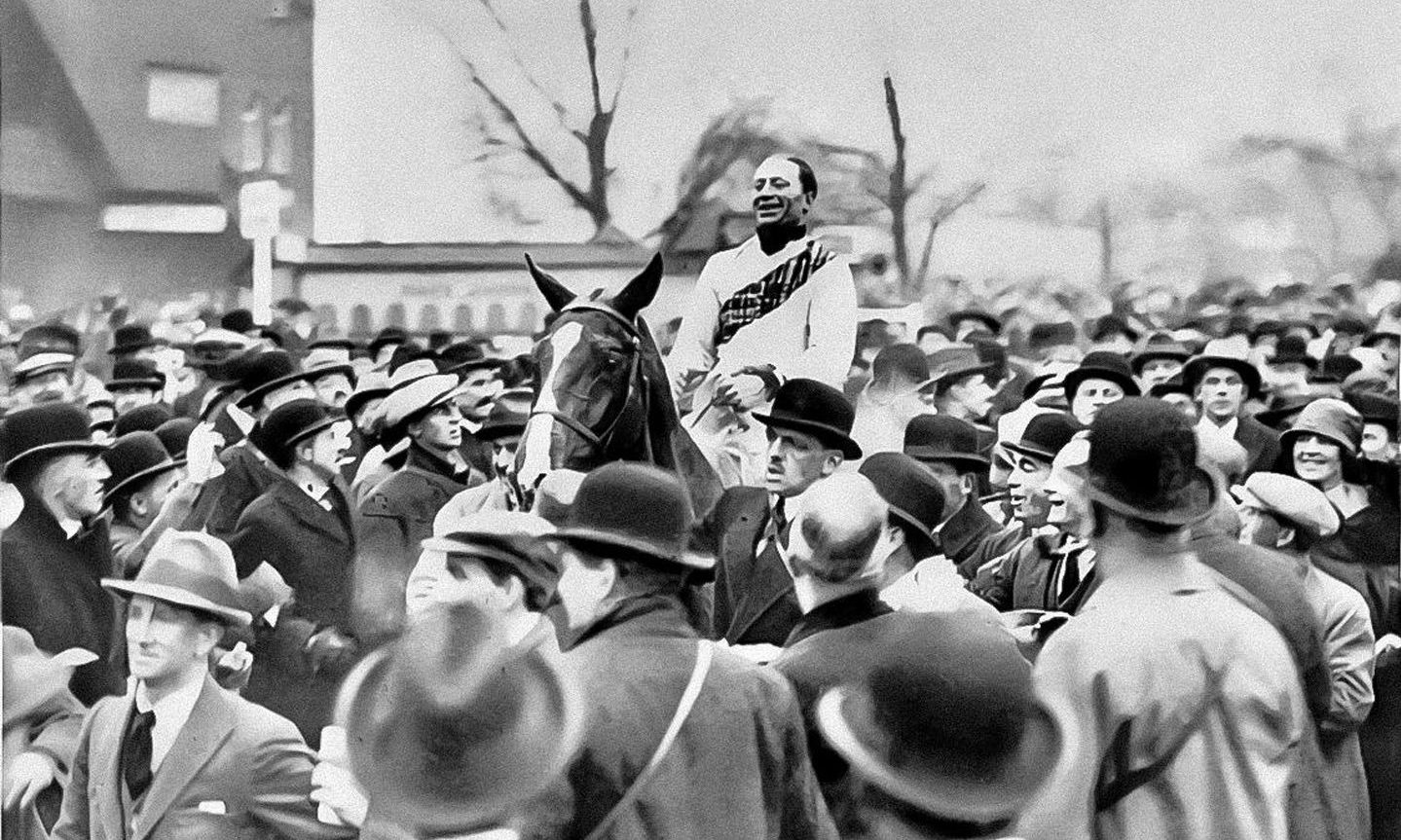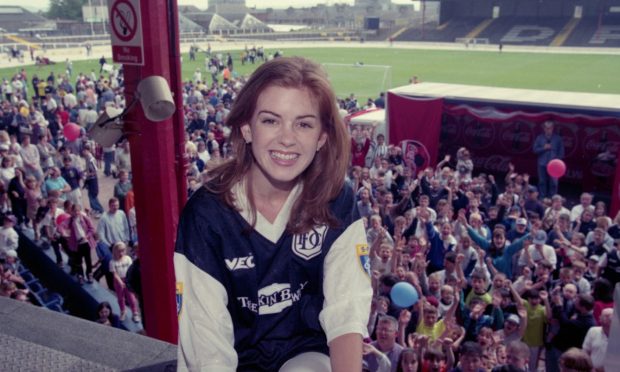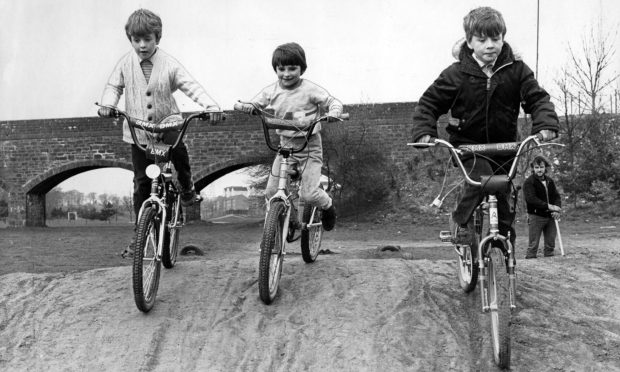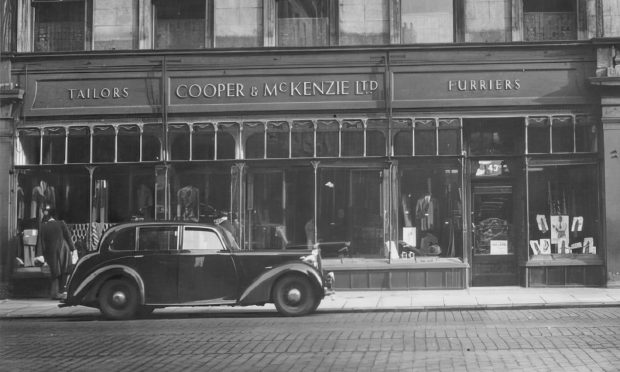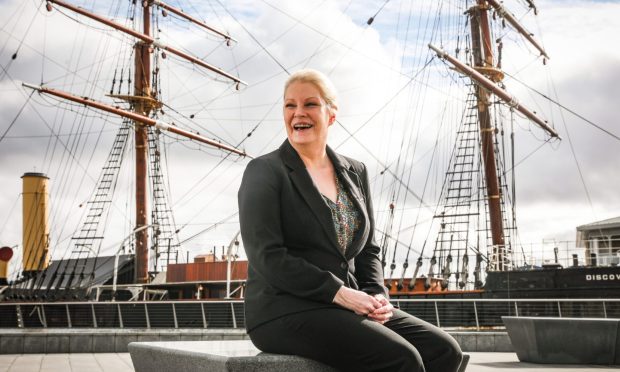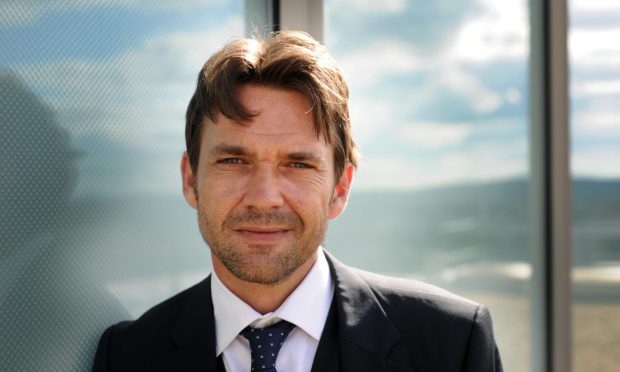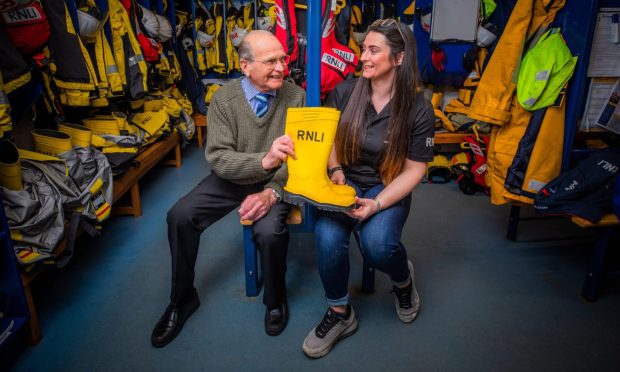Derek Johnstone is the boy from Dundee who became a Rangers cup final hero aged just 16.
He was still living in Findowrie Street in Fintry when he scored the winning goal in the 1970 League Cup Final 50 years ago against Jock Stein’s all-conquering Celtic side, just a month after making his Rangers debut against Cowdenbeath.
Tragedy and triumph
Mum Emily watched him score at Hampden and she was the glue that held the family together through tragedy and triumph.
“I grew up with six brothers and we all played football,” said Derek.
“We all just kicked a ball about in the back garden or out in the street and would use the fences as the goals.
“My mother was always chasing us out because she never had any grass in the back garden because we were always in there playing football.
“I had a very happy childhood growing up in Fintry apart from my dad leaving us early.
“He died when I was 10 and my mum brought us all up and she did a fantastic job.
“My mum had about three or four jobs and then my elder brothers started working and bringing money into the house so we were fine.
“It was an enjoyable time and we were never short of anything.
“Fintry holds a lot of happy memories for me and there wasn’t a lot of trouble in these days.
“Everybody just got on with each other and I can’t remember my mum ever having to lock the doors.
“We also had the comfort zone of knowing that I had six brothers and people knew that if they took on one of us they’d have six others to deal with.
“I went back to Fintry several years ago just to have a look at the old house and it just looked so different.
“I drove up and down the street and drove around Fintry and most of it has changed but the memories will never go away that’s for sure.”
Derek went to Fintry Primary and Linlathen High School and mainly played as a striker in the football team but could also perform in central defence and in midfield.
He said: “Football was the main thing but when I went to secondary we also played hockey and rugby and athletics and I loved all of that.
“I think I still hold the record for the high jump for the Dundee schoolboys.
“It was incredible and it was a scissor jump rather than the Fosbury Flop and it was a case of jumping with one leg like a pair of scissors over this bar and I’d beaten the record by about two or three inches.
“So anything I went into that was to do with sport I loved.”
Derek started to attract the attention of scouts when he was playing for Linlathen and he was invited to go through to Glasgow to spend the summer training with Rangers at the age of 12 after turning down Dundee United.
“I would play up front and score lots of goals and sometimes if we played a good side I would play in defence,” he said.
“Secondary school was probably where it mattered most because not only did I play for Linlathen but I also played for St Francis in the afternoon who played in Celtic strips.
“My brother had played for them so it was an automatic thing.
“When I was 12 or 13 I was standing out then and scouts started to come and watch me.
“I was scoring goals for fun at Linlathen and scouts were watching the games and the first person that came up to me was the Dundee United scout.
“Our house was a Dundee United house and I went to train on a Tuesday and Thursday night but that was the same time as the part-time players were in. All they did was run around the park and there was very little ball work and I didn’t fancy that and thought if this is what football’s all about then I don’t want to do it.
“I kept plugging away and one day Rangers came in and that was it and it was a no-brainer.
“It was the first time I had left Dundee and that was very very strange and I had to go on the train on my own.
“These were all new things that were happening to me at a very young age.
“It just escalated from there.
“All the holidays I had from school I would go through to Glasgow and I loved everything about it.”
Signing battle
Derek signed for Rangers as a schoolboy in 1968 although he was also wanted by Jock Stein whose Celtic team had won the European Cup in a halcyon period where they would go on to win nine-in-a-row.
The Old Firm battle for Derek’s signature was played out in Findowrie Street.
Derek said: “There was a time when I was back home and the Rangers scout Tommy Gray came to me.
“He drove up the street in Findowrie Street and he saw a huge silver Mercedes car outside my house.
“Right away he’s thinking to himself: ‘A Mercedes in Fintry? You are having a laugh here’.
“He realised Jock Stein had arrived and wanted me to sign for Celtic.
“At that time there was a school cruise called the Dunera and all the boys in my class had money to go, but we didn’t have money to go.
“Inside the house my brother Bobby – who was looking after me and was probably one of the first agents – cheekily said: ‘How much money would he get for signing?’ Jock said: ‘We don’t pay anybody. We’ve just won the European Cup. People want to play for us’.
“Bobby said: ‘Okay, we’ll get in touch with you down the road if we want to come to Celtic’.
“Tommy Gray had by now gone to a phone box to call Rangers manager Davie White after seeing Jock’s Mercedes parked at the top of the road.
“He explained Jock Stein was in the house and Davie White told him: ‘Look I want you to go in that house and make sure he signs for the Rangers’.
“The minute Jock left, Tommy came to the door, and Bobby asked him the same question.
“Tommy told me: ‘I know you’ve probably been offered a lot of money by Celtic…’
“I was just about to say to him: ‘Well, actually no’, when my brother stopped me and said: ‘Oh yeah, what a life-changing sum of money…we cannot believe what we were offered’.
“Tommy Gray told us he’d been instructed to offer me £1,000 and my mum £1,000 and that was a hell of a lot of money in those days – a year’s wages for some people. So my brother said to me: ‘What do you think?’ I told him: ‘I’m signing for the Rangers’ because I realised I could actually go on this cruise with my pals from the school.
“A few months later I went and signed for Rangers, came back, went on the cruise, absolutely hated it and I was sick every day for 10 days.”
Derek eventually made his first-team debut in September 1970 against Cowdenbeath at Ibrox and he scored two goals in a 5-0 win.
“I absolutely loved it because I had dreamt as a kid of playing professional football and to actually play and score two goals for a club like Rangers was phenomenal and a great feeling,” he said.
“After that I was on the bench a couple of times and come October was the League Cup Final.
“That’s when it really sunk in that I was a Rangers player.”
On a Friday the first team list would be put up on the board along with the reserve team list.
The players were told to stay behind if they were in the first team squad for the League Cup Final and Derek got up to walk out the door.
He was stopped in his tracks by first team coach Jock Wallace who dragged him up to the board.
Derek’s name was in the first team squad which then went off to train before Willie Waddell and Jock Wallace named the team.
Before they did they took Derek into the manager’s office and broke the news that he would be starting.
He was handed four tickets and told to bring his family through.
Derek said: “I was just stunned and the first thing I said to Jock was: ‘You’ll need to give me another two tickets because I’ve got six brothers’.
“I can’t repeat what Jock said to me!
“He told me to go home and have a good night’s kip but in truth I can’t even remember going home on the train to Dundee.
“My mind was other places.
“The man who served the meal on the train was Denis Law’s brother and I would always get a soup and a steak and talk to him about Denis.
“That day I can’t even remember eating the soup.
“I got home and I got the bus back to Fintry and I told my mum I was playing and then my brothers came in and they were absolutely ecstatic – they thought it was wonderful.
“I gave two tickets to friends and it was my mum and Bobby that came through to the game.”
Career highlight
Derek said scoring the winner at Hampden in 1970 ranks as one of the biggest highlights of his career.
“I can still see it now,” he said.
“Willie Johnston crossed the ball in with his right foot and I managed to get above big Billy McNeill and Jim Craig who were either side of me and heading the ball past Evan Williams.
“There were 106,000 there that day.
“It was surreal.
“It all happened so slowly or it seemed that way.
“I didn’t know how to celebrate when I scored so I just ran about like a mad man! But what an absolutely incredible feeling. It was beyond anything I had ever dreamt of. Half the Rangers fans at that time wouldn’t have known me if I’d walked past them in the street but after that they certainly did.”
Mum Emily being there to watch her son’s Hampden heroics made it extra special.
He said: “My mum was there and watched me score.
“That was the only two games she saw – the League Cup Final and also European Cup Winners’ Cup Final in Barcelona.
“She certainly picked her games.
“Most people would say their mums are the nicest person in the world but mine was.
“She lost her husband at a relatively young age and had to bring us all up, make sure we were all brought up the right way, make sure we were all fed and clothed.
“She deserved that.
“I think she absolutely loved Barcelona in 1972.
“She didn’t really want to go there because she wasn’t a woman that travelled a lot.
“I don’t think she had ever been abroad.
“Holidays she would maybe go to Arbroath or Butlins in Ayr but we couldn’t really afford to go abroad.
“When the manager said to us we could bring our wives and girlfriends to Barcelona I asked if I could bring my mum.
“I didn’t have a girlfriend or a wife and I think myself and Graham Fyffe both took our mothers and they both had a ball over there looking after all these young girlfriends and wives.
“It was a fantastic trip and she was really, really ecstatic when we won. It was probably the best three or four days she ever had.
“She went abroad and watched her son win a major trophy.
“She was as proud as punch.”
Derek almost lost his winners’ medal in 1970 when he left it in a sock drawer in Reykjavik just a day after the Hampden final.
“I was the youngest in the side and everyone else was having a party but I couldn’t because I was 16 and I had also been picked to go with Scotland under-18s the following day to play in Reykjavik in a tournament along with Graeme Souness who was in that squad,” he said.
“I stayed the night with John Greig’s uncle and he took me to the airport the following day.
“When we got there the former Dundee player Bobby Seith was the Scotland coach and he left me out because he said I didn’t have enough experience.
“I felt like saying: ‘I’ve just played in front of 106,000 people and scored a winning goal in a cup final!’
“He didn’t play me but when I got there I put my medal at the back of the sock drawer in the room so if anyone broke in they wouldn’t find it. “We were on the plane coming back and one of the lads asked to see my medal and I went: ‘Oh Christ!’
“I got off the plane and went to Ibrox and told Willie Waddell I had lost my cup final medal.
“Willie was brilliant and phoned the hotel and I got the medal back two days later.
“I thought I’d lost it but what an experience that was.”
Rangers legend
Derek said it would be difficult to single out one accomplishment from a career which brought 210 goals in 546 games for Rangers
He was in the Rangers team which won the Cup Winners’ Cup in 1972 and domestically won three League Championships, five League Cups and five Scottish Cups.
He was voted Scottish Players’ Player of the Year and the Football Writers Player of the Year in 1978 and won 14 caps for Scotland.
“Making my debut against Cowdenbeath and scoring two goals was utopia as far as I was concerned,” said Derek.
“Then the League Cup comes along and it is another high then the Cup Winners’ Cup comes along and it’s an even bigger high.
“But throughout my career there were so many highlights that it’s just not true.
“I won three League Championships, five League Cups, five Scottish Cups, the Glasgow Cup, the Cup Winners’ Cup and got 14 caps.
“It wasn’t a bad career but what made it so special was I did it all with the same club. I had umpteen chances to go to England in my prime but decided I was happy where I was. Financially it would have been better but I was delighted to be at Rangers and the whole family were blue noses and I was a blue nose and I just loved the club and everything about it.
“The thought of leaving Rangers would give me sleepless nights.”
Having been placed on the transfer list by John Greig in April 1983, Derek left Rangers after the 1983 Scottish Cup Final defeat against Aberdeen to join Chelsea in the Second Division for a £30,000 transfer fee.
He failed to dislodge the established strike partnership of Kerry Dixon and David Speedie and made just four appearances at Stamford Bridge before going on loan for a month to Dundee United.
He was temped back to Rangers by Jock Wallace in January 1985 and made just over 20 appearances over the next year.
Derek was handed a free transfer when Graeme Souness took over in the summer of 1986 and there was a short spell in management with Partick Thistle before he retired from the game and took up a role in the media.
Derek said: “I’m now an ambassador for Rangers and I go round the hospitality boxes on matchday and all the former players get together before and talk about the good times and it’s always great to see the lads.
“It is still great after all these years to go into Ibrox.
“I went there first as a 14-year-old in 1968 and it still gives me the same buzz walking in the door.
“It’s wonderful.”
The doorbell never stopped ringing as the Johnstone family celebrated
The Johnstone family celebrated Derek’s Old Firm cup final heroics in 1970 with an impromptu house party.
Derek’s youngest brother David still has special memories of the night when the doorbell at Findowrie Street never stopped ringing.
David, who still lives in Dundee, wasn’t told that Derek would be starting for Rangers which made what eventually unfolded that afternoon all the more special.
“As for the cup final day I remember it really well,” he said.
“Brian and I weren’t told Derek was playing, probably because we’d have told everyone, so with my mum away for the day we spent the day with my aunt Bella and uncle Pat in Cheviot Crescent.
“When the football came on, normally about 4.30pm, we saw Rangers were winning.
“My aunt asked who scored and I said Willie Johnston but she asked me to look again.
“Suddenly we realised it was ‘Johnstone’ and Brian and I were jumping around her living room like lunatics.
“Later that night when my mum and Bobby got home I remember a big party in the house and our door never stopped with people congratulating my mum.”
Derek’s six brothers made regular trips to Ibrox as he became an established figure in the first-team.
And he told how his late mum – who didn’t like football – would listen to every Rangers game on the radio as Derek’s career took off.
“We were always well looked after when we watched Derek at Ibrox,” recalled David, who enjoyed his own career as an amateur footballer, including a testimonial match where he played alongside George Best.
“I used to love going to watch Derek as well as watching all my brothers playing but obviously going to see Rangers was special.
“My mother became a real radio supporter as there wasn’t that much on TV in those days.
“If any of us were out on a Saturday and wanted the score we’d phone mum knowing she’d be listening.
“She was an incredibly proud mother of all her boys and loved nothing better than when we were all in her house together talking of the old days.”
